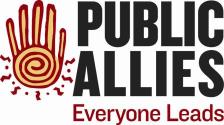As an ally placed at the City of San Jose, I’m learning how to navigate institutions and try to make change from within. Most of my day consists of me working at my cubicle and I often miss the face-to-face interactions with community.
That’s why one of my favorite aspects of the Public Allies program is Team Service Project. This year, Public Allies Silicon Valley/San Francisco received many great project submissions. My team, Team Synergy, had the opportunity to create and facilitate a training about Political Education for De Anza Community College students. The goal of the training was to give the students the knowledge and tools to be successful as mentors for high school youth.
Through the Power & Privilege Bead Activity, mentors had the opportunity to reflect on their own power and privilege and how they can consciously bring these aspects of themselves to youth mentorship.
The training was Team Synergy’s second training with De Anza! We still have around 3 more trainings to tackle in the remaining months. I’m excited to see the mentors grow through the trainings and the impact that they will have on their youth. But I’m also excited to see how Team Synergy will grow through collaboration with De Anza. For myself, I definitely learned a lot about my facilitation style and what aspects I want to improve on. My Team Service Project has also taught me what it means to build the capacity of other leaders and to keep our movement(s) sustainable.





